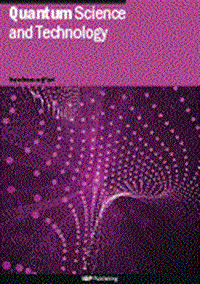The travelling salesperson problem and the challenges of near-term quantum advantage
IF 5
2区 物理与天体物理
Q1 PHYSICS, MULTIDISCIPLINARY
引用次数: 0
Abstract
Over the last two decades, the travelling salesperson problem (TSP) has been cited as a benchmark problem to demonstrate the advantage of quantum computers over conventional computers. Its advantage is that it is a well-studied NP-hard optimisation problem that can be easily communicated to highlight the challenges of searching through an exponentially growing number of possible solutions to find the optimal solution. It is therefore a tempting problem to choose to explore quantum advantage. At what point, however, is a call made that quantum advantage is not likely, and efforts should be focused on other problems? This article challenges the continued use of the TSP as a benchmark for quantum optimisation methods—such as quantum annealing and gate-based quantum computing—that require the TSP to be formulated as a quadratic unconstrained binary optimisation (QUBO) problem. We offer explanations for why such quantum approaches are not well suited, nor competitive against state-of-the-art classical methods, for tackling the challenges of the TSP landscape, and we draw parallels with similar observations made almost four decades ago when QUBO-based neural networks proved to be uncompetitive for solving the TSP. After critically reviewing two decades of research effort to solve TSPs using QUBO-based quantum methods, we note a gradual shift in focus: from initial attempts to solve small sized TSPs with general-purpose QUBO-based quantum approaches, to growing evidence that competitiveness is only enhanced where TSP domain knowledge is integrated, via either modified formulations or hybridisation with TSP classical heuristics. We discuss the numerous challenges that must be overcome before QUBO-based quantum optimisers could ever be competitive with classical state-of-the-art TSP solvers. Acknowledging that there may be more promise for non-QUBO-based hybrid approaches, where quantum search accelerates components of conventional algorithms, we offer recommendations for how future studies should be conducted to compare fairly and rigorously any proposed quantum methods against state-of-the-art TSP solvers, or any classical optimisation method, when seeking to establish quantum advantage.出差销售人员问题和短期量子优势的挑战
在过去的二十年里,旅行推销员问题(TSP)被引用为一个基准问题,以证明量子计算机相对于传统计算机的优势。它的优点是,它是一个经过充分研究的NP-hard优化问题,可以很容易地传达,以突出搜索指数增长数量的可能解决方案以找到最优解决方案的挑战。因此,选择探索量子优势是一个诱人的问题。然而,在什么情况下,人们才会认为量子优势不太可能存在,而应该把精力集中在其他问题上?本文对继续使用TSP作为量子优化方法(如量子退火和基于门的量子计算)的基准提出了挑战,这些方法要求将TSP表述为二次型无约束二进制优化(QUBO)问题。我们解释了为什么这种量子方法不太适合,也不能与最先进的经典方法竞争,以应对TSP景观的挑战,我们与近40年前基于qubo的神经网络被证明对解决TSP没有竞争力的类似观察进行了类比。在批判性地回顾了二十年来使用基于qubo的量子方法解决TSP的研究工作之后,我们注意到焦点的逐渐转变:从最初尝试使用基于通用qubo的量子方法解决小型TSP,到越来越多的证据表明,只有在TSP领域知识集成的情况下,通过修改公式或与TSP经典启发式混合,竞争力才会增强。我们讨论了在基于qubo的量子优化器能够与经典的最先进的TSP求解器竞争之前必须克服的许多挑战。承认非基于qubo的混合方法可能有更多的希望,其中量子搜索加速了传统算法的组成部分,我们提供了关于如何进行未来研究的建议,以便在寻求建立量子优势时,公平和严格地比较任何提出的量子方法与最先进的TSP求解器或任何经典优化方法。
本文章由计算机程序翻译,如有差异,请以英文原文为准。
求助全文
约1分钟内获得全文
求助全文
来源期刊

Quantum Science and Technology
Materials Science-Materials Science (miscellaneous)
CiteScore
11.20
自引率
3.00%
发文量
133
期刊介绍:
Driven by advances in technology and experimental capability, the last decade has seen the emergence of quantum technology: a new praxis for controlling the quantum world. It is now possible to engineer complex, multi-component systems that merge the once distinct fields of quantum optics and condensed matter physics.
Quantum Science and Technology is a new multidisciplinary, electronic-only journal, devoted to publishing research of the highest quality and impact covering theoretical and experimental advances in the fundamental science and application of all quantum-enabled technologies.
 求助内容:
求助内容: 应助结果提醒方式:
应助结果提醒方式:


